Japan Slips Into Recession, Loses Third-Biggest Economy Status To Germany

Image Source: Pixabay
- Japan's GDP contracted by 0.4% in the last quarter of 2023.
- This marks two consecutive quarters of economic decline, meeting the technical definition of a recession.
- This has raised concerns about Japan's economic outlook and the timing of potential policy adjustments.
Japan has unexpectedly slipped into a recession, with its gross domestic product (GDP) contracting by 0.4% in the last quarter of 2023, following a 3.3% slump in the previous quarter.
This marks two consecutive quarters of economic decline, meeting the technical definition of a recession.
As a result, Japan has lost its position as the world’s third-largest economy to Germany, raising concerns about the country’s economic outlook and the timing of potential policy adjustments.
Concerns over Bank of Japan monetary policy
The unexpected downturn in Japan’s economy has raised doubts about the timeline for the Bank of Japan (BOJ) to exit its ultra-loose monetary policy, which has been in place for over a decade.
While analysts had anticipated the BOJ to phase out its monetary stimulus this year, the weak GDP data may delay this decision.
The central bank introduced negative interest rates in 2016 to boost spending and investment, but the prolonged economic challenges have complicated its exit strategy.
What led Japan into recession?
Weak demand in China, sluggish consumption patterns, and production halts at a unit of Toyota Motor Corp have all contributed to Japan’s economic contraction.
Private consumption, a significant driver of economic activity, fell by 0.2%, while capital expenditure also declined by 0.1%. External demand, however, made a modest contribution to GDP growth as exports rose by 2.6% from the previous quarter.
Japan’s growth prospects
The news of Japan’s recession has prompted market uncertainty, with analysts expressing concerns about the country’s sluggish growth prospects.
While the BOJ had been preparing to end negative interest rates and overhaul its monetary framework, the weak economic data may prompt a more cautious approach. Some analysts predict a gradual policy adjustment, with expectations for the negative rate policy to be abandoned by April.
Despite the challenges posed by the recession, some analysts remain optimistic about Japan’s economic resilience. Tight labour market conditions and robust corporate spending plans offer potential avenues for recovery.
However, sluggish growth is anticipated in the near term, with uncertainties surrounding household savings rates and consumption patterns. The BOJ’s upcoming meeting in March will be closely monitored for insights into its policy stance and future trajectory.
More By This Author:
Cisco Announces Layoffs As Q2 Earnings Beat EstimatesBitcoin Approaches $52k, Surpasses Tesla With $1T Market Cap
Cathie Wood Loads Up On Shares Of Archer Aviation Inc
Disclaimer: Invezz is a place where people can find reliable, unbiased information about finance, trading, and investing – but we do not offer financial advice and users should always ...
more


